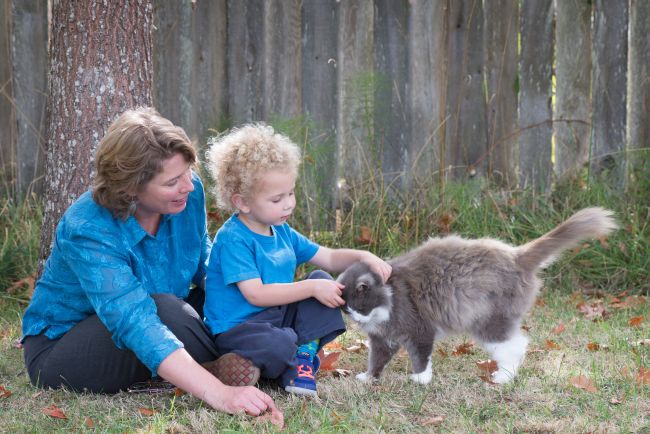 According to the Academy of Anxiety and Depression of America, anxiety disorder and depression afflict nearly one in eight children. However, many parents have found that owning a pet significantly decreases the severity of their child’s depression. The term “therapy pet” often makes us think of cheerful dogs, but felines can actually be certified therapy pets as well. The companionship of cats has shown to effectively improve the emotional and mental wellbeing of children struggling with mental illnesses. Unlike dogs, who can bring a light, “bouncy” presence, cats have a weightiness and steadiness that suits those battling severe melancholy. Consider the below reasons why owning therapy cats will help with childhood depression.
According to the Academy of Anxiety and Depression of America, anxiety disorder and depression afflict nearly one in eight children. However, many parents have found that owning a pet significantly decreases the severity of their child’s depression. The term “therapy pet” often makes us think of cheerful dogs, but felines can actually be certified therapy pets as well. The companionship of cats has shown to effectively improve the emotional and mental wellbeing of children struggling with mental illnesses. Unlike dogs, who can bring a light, “bouncy” presence, cats have a weightiness and steadiness that suits those battling severe melancholy. Consider the below reasons why owning therapy cats will help with childhood depression.
1. Unconditional friendship: School children can be fickle and even cruel at certain ages, so having a cat as a close friend and confidante can help provide the emotional security needed when people are undependable. Cats rely on us for their comfort and provision, and value us accordingly. Many children suffering from depression have described their pets as “their best friend,” having been greatly comforted by the unconditional love a cat brings.
2. Responsibility: Caring for a pet allows the child not only to take on new responsibilities, but also to experience a sense of worth, self-esteem and pride when one accomplishes tasks and chores, proving they can adequately provide for another creature. Compared to dogs, cats fortunately do not require as much “dirty work” as puppy poop-scooping does. Emptying out the litter box is a relatively simple process in a smaller area, and doesn’t require discouraging bouts of hunting around the yard for smelly dog landmines. Cats also generally require less grooming, meaning that brushing them will require the right amount of responsibility without becoming an overwhelming chore.
3. Routine: Establishing a consistent routine is one of the best ways to combat depression. Getting on a regular schedule helps build a sense of boundaries and consistency when a child might need to feel protection and structure in his life. Something as simple as waking up, feeding the cat, brushing her, and then playing with her for 30 minutes after school, could do wonders for a child.
4. Affection: Human touch is an important aspect of health and wellness, and when another person is not available for hugs and cuddles, cats provide a ready substitute. It has been proven that stoking and petting animals actually releases positive endorphins in humans. There is nothing more assuring than cuddling a fuzzy, warm little animal that is just thrilled to see you when you walk in the door!
5. Distraction: By focusing on an animal, it brings the child’s awareness away from their own circumstances, feelings, or moods and helps them direct their attention on something more constructive than feelings of defeat. Sometimes an exchange of perspective and focus is enough to improve a child’s overall mental and emotional health.
6. Entertainment: Laughter is oftentimes the best medicine, and having an animal around helps get us out of our own minds and lighten up a little. The same applied to children. Cats are not only adorable, but are hilarious to watch. This might be anything from watching your kitty race after a motorized toy, or leaping to “catch” the laser point, or contorting its bodies in bizarre postures. When your baby has the blues, playing with a cat can bring smiles and giggles to any gloomy face.
7. Social expression: While a child might have difficulties expressing their worries, fears or feelings to another person, there may be less of a struggle with a cat. Investing time with a feline will help children communicate, but it could also segue into a healthy way of connecting with other people. This might manifest as your child inviting a friend over to play with the cat, or sharing stories with a pal about their silly pet. Having the comfort and companionship of a kitty can do wonderful things for a struggling child.

